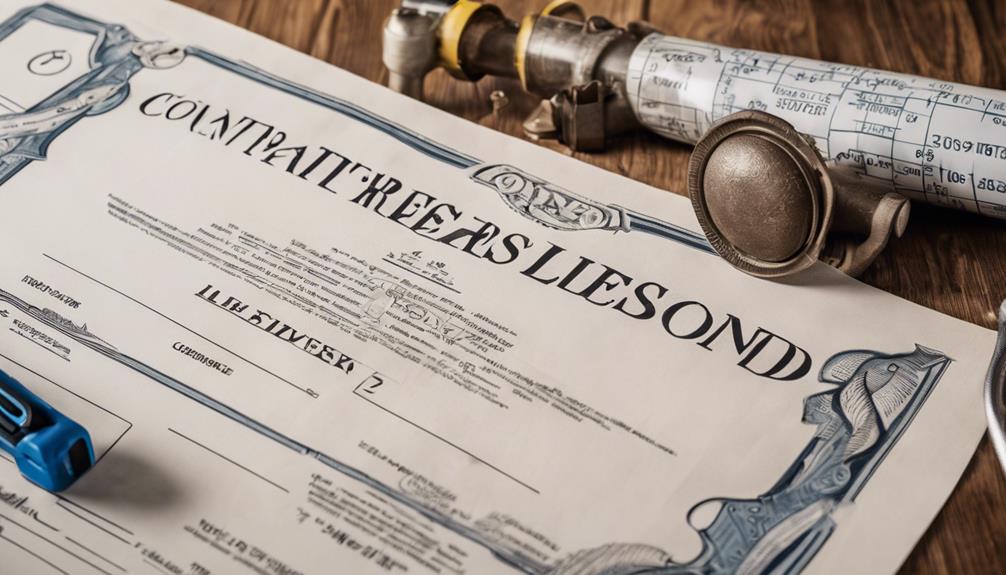If you're considering becoming a contractor in Lynchburg, VA, you need to understand the significance of a Contractor's License Bond. This bond isn't just a formality; it's a crucial element that ensures you're compliant with local regulations and protects your clients. Without it, you might find yourself facing obstacles that could hinder your business growth. Curious about how to secure this bond and what it might cost you? Let's explore the details that can make or break your contracting career.
What Is a Contractor's License Bond?

A contractor's license bond serves as a safety net for both clients and contractors, ensuring that everyone plays by the rules. This bond is a legal agreement between you, the contractor, a surety company, and the state. Essentially, it guarantees that you'll comply with local laws and regulations while performing your work.
By obtaining this bond, you're also aligning yourself with the regulatory framework that governs contractor practices in your area, which can help avoid potential legal issues.
When you obtain this bond, you're demonstrating to your clients that you're serious about your obligations. If you fail to meet these obligations—like not completing a project according to the contract or violating building codes—clients can file a claim against the bond. If the claim is validated, the surety company will compensate your client up to the bond's limit, and then you'll be responsible for repaying that amount.
In Lynchburg, VA, having a contractor's license bond isn't just a good practice; it's often a requirement for obtaining your contractor's license.
Importance of a Contractor's License Bond
Understanding the importance of a contractor's license bond can significantly impact your business. A contractor's license bond acts as a safety net, ensuring that you adhere to industry regulations and standards. When clients see that you have this bond, they gain confidence in your professionalism and reliability. It's a key factor that sets you apart from competitors who may not have one.
Moreover, these bonds are designed to hold businesses accountable for adhering to licensing laws, providing extra assurance to clients and government entities alike. License and permit bonds protect the public from potential malpractice.
Moreover, a license bond protects you and your clients. If you fail to meet contractual obligations or engage in unethical practices, the bond provides financial compensation to affected parties. This not only protects your clients but also safeguards your reputation in the industry.
Having a contractor's license bond can also open doors to more opportunities. Many clients, especially larger corporations or government projects, require contractors to hold a valid bond before considering them for a job. This requirement means that without a bond, you could miss out on lucrative contracts.
Licensing Requirements in Lynchburg

When it comes to operating as a contractor in Lynchburg, knowing the licensing requirements is crucial for your success. You'll need to obtain a contractor's license issued by the Virginia Department of Professional and Occupational Regulation (DPOR).
The first step involves determining the type of license you require, which can vary based on the scope of work you plan to undertake. Additionally, understanding the importance of securing necessary surety bonds can provide financial security and enhance your credibility in the industry, as Illinois Surety Bonds highlight.
For general contractors, you'll typically need a Class A, Class B, or Class C license, depending on the total value of the contracts you'll be handling. Class A licenses allow you to work on projects over $120,000, while Class B is for projects between $10,000 and $120,000, and Class C is for contracts up to $10,000.
You'll also need to provide proof of experience, which usually involves showing documentation of your work history in the construction field. Additionally, a background check will be conducted.
Be prepared to pay the associated fees and complete any required examinations. By understanding and meeting these licensing requirements, you'll be well on your way to establishing a successful contracting business in Lynchburg.
How to Obtain a Contractor's License Bond
Securing a contractor's license bond is a vital step in establishing your business in Lynchburg. To obtain this bond, you'll first need to gather all necessary documentation, including your contractor's license and proof of your business entity.
It's essential to have your financial information ready, as bond companies will review your credit history and financial stability.
Next, research bonding companies that operate in Virginia. Look for reputable providers with experience in the contractor bonding process.
Once you've identified potential bonding companies, reach out to them for quotes. You'll want to compare rates and terms to find the best fit for your needs.
After selecting a company, complete their application form. Be prepared to provide detailed information about your business, including its history and any prior claims or disputes.
Once your application is approved, you'll need to pay the premium to secure the bond.
Upon payment, the bonding company will issue your license bond, which you must then submit to the appropriate licensing board in Lynchburg.
With your bond in hand, you'll be one step closer to operating your contracting business successfully.
Cost of a Contractor's License Bond

The cost of a contractor's license bond can vary significantly based on factors like your credit score, the type of work you'll be doing, and the bond amount required by your local licensing board.
Typically, you can expect to pay a percentage of the total bond amount, which usually ranges from 1% to 15%. For instance, if your bond requirement is $10,000, your premium might fall between $100 and $1,500.
Your credit score plays a crucial role in determining your specific rate. If you have excellent credit, you'll likely secure a lower premium, while poor credit can lead to higher costs.
Additionally, the nature of your work influences the bond's price. Higher-risk industries, like construction, may have steeper bond costs due to the increased likelihood of claims.
It's essential to shop around and compare quotes from various surety bond companies. This way, you can find the best deal that meets your needs.
Don't forget to factor in any additional fees or charges that might apply during the bonding process to ensure you're fully prepared for the total cost involved.
Common Misconceptions About Bonds
Many people misunderstand the purpose and function of contractor's license bonds, leading to confusion about their importance. One common misconception is that these bonds act like insurance for contractors. In reality, they protect the public by ensuring that contractors adhere to regulations and fulfill their contractual obligations. If a contractor fails to meet these obligations, the bond can provide financial compensation to affected parties, but it doesn't cover the contractor's own losses.
Another myth is that obtaining a contractor's license bond is optional. In Lynchburg, VA, having a bond is a requirement for getting a contractor's license. This bond serves as a guarantee that you'll operate legally and ethically.
Some also think that all bonds are the same. However, contractor's license bonds vary by state and industry, each with specific requirements and coverage limits.
Lastly, many believe that bonding is a simple process. While it can be straightforward, it still involves paperwork, background checks, and approval from bonding companies.
Understanding these misconceptions can save you time and effort, ensuring you're better prepared to navigate the bonding process effectively.
Tips for Maintaining Compliance

Maintaining compliance with contractor's license requirements is crucial for your business's success in Lynchburg, VA. To ensure you stay on track, start by familiarizing yourself with local regulations and licensing requirements. Keep a checklist of necessary documents, such as your contractor's license and insurance certificates, so you can easily verify that everything is up to date.
Next, set reminders for renewal dates. It's easy to overlook deadlines, but a lapse in your license can lead to fines or even business shutdowns. Regularly review your contracts to ensure they comply with state and local laws.
Consider joining a professional organization or trade association. These groups often provide resources, training, and updates on changes in regulations. Networking with other contractors can also give you valuable insights into best practices.
Don't forget to maintain accurate records of your projects, licenses, and any correspondence with regulatory agencies. Keeping detailed records not only helps you stay compliant but can also protect you in case of disputes.
Lastly, consult with a legal professional who specializes in contractor law to clarify any uncertainties you may have. Staying informed and proactive is key to maintaining compliance and ensuring the longevity of your business.
Conclusion
In conclusion, securing a Contractor's License Bond in Lynchburg is essential for your business's success. It not only ensures compliance with local regulations but also builds trust with clients, enabling you to take on bigger projects. By understanding the requirements and costs, you can navigate the process smoothly. Remember, maintaining compliance is key to protecting your reputation and ensuring long-term growth. Don't underestimate the value of this bond—it's a crucial step in your contracting journey!

